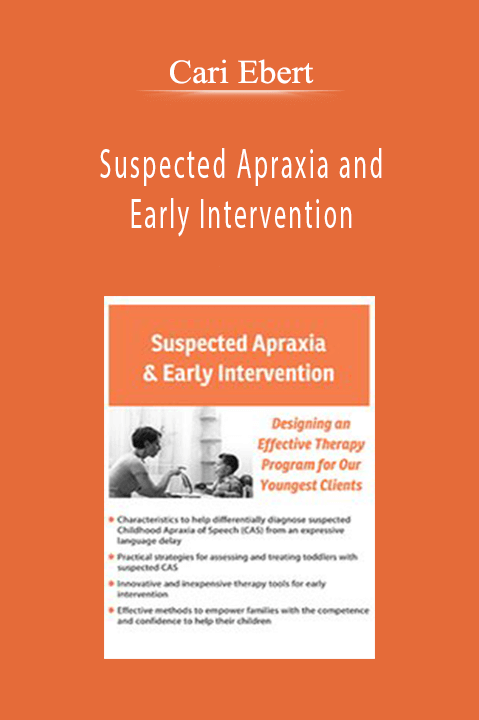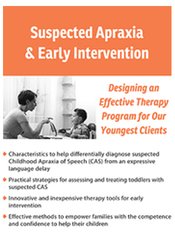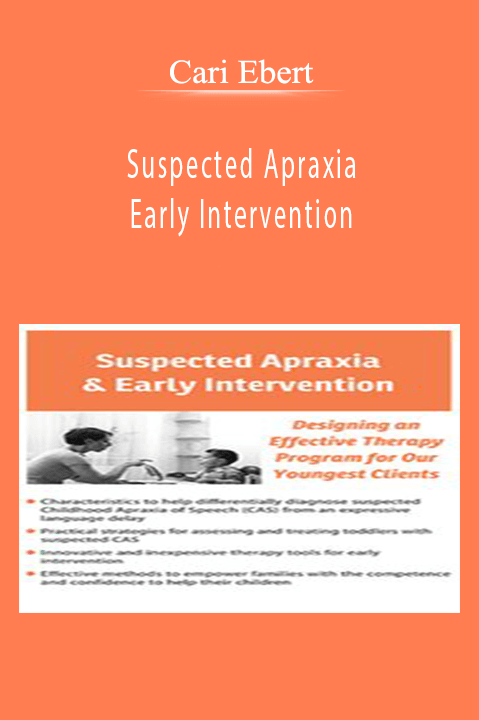Cari Ebert – Suspected Apraxia and Early Intervention
Being able to effectively communicate is how young children interact, socialize, and learn. There is cause for concern when a young child has strong cognitive and receptive language skills, but is essentially non-verbal. It is important for therapists to be able to differentially diagnose an expressive language delay from suspected Childhood Apraxia of Speech (CAS). Therapy for a toddler with suspected CAS should have a set of unique parameters that will facilitate the development of motor planning skills. Because children with suspected CAS often progress slowly and demonstrate highly inconsistent verbal productions, it can be difficult to measure progress and documentation can be a challenge. Caregiver involvement is a critical component of early intervention services and each family needs to be provided with functional strategies that can be embedded into their daily routines to help their child become an effective verbal communicator.
This recording is packed full of clinically relevant ideas and activities to fine-tune therapy sessions for young children with suspected CAS. After watching this course you will look at your caseload in a whole new light and be able to pinpoint which children are in need of more specialized programming. Therapists will gain hands-on knowledge of ways to modify existing therapy materials designed for older kids with CAS to make them fun and functional for use with toddlers. From assessment, to therapy materials, to documentation standards, participants will discover ways to create the best therapy model for toddlers on their caseload with suspected Childhood Apraxia of Speech.
- Describe how to recognize the characteristics of CAS in late-talking toddlers, and how this informs treatment interventions
- Develop the ability to differentially diagnose suspected CAS from an expressive language delay, autism spectrum disorder, dysarthria, and a phonological impairment
- Acquire practical and effective treatment interventions for treating toddlers with suspected CAS
- Articulate the importance of partnering with families throughout the early intervention process to maximize each child’s potential
- Recognize the academic issues associated with CAS, and how this informs treatment interventions
- Outline methods for creating functional IFSP outcomes
OVERVIEW
- Defining apraxia
- types of apraxia
- clinical definitions
- explanation for families
- Birth to 3 programs and eligibility issues
- Early brain development
ASSESSMENT OF CAS
- Formal vs. informal assessment
- Characteristics of toddlers with suspected CAS
- Characteristics of 3-5 year olds with CAS
- Academic issues and CAS
- Co-existing conditions
- Informal assessment hierarchy
DIAGNOSIS
- Should we diagnose CAS in toddlers?
- Misdiagnosing CAS
- Prevalence of CAS
- Making a differential diagnosis
THERAPY
- Frequency and duration of services in early intervention
- Purpose of EI
- Family participation
- Fun and effective therapy without drill work
- Goals and activities for the pre-verbal child
- Articulation vs. motor planning therapy
- Strategies for families and caregivers
- To sign or not to sign
- Picture communication
- Prognosis
DOCUMENTATION
- Writing IFSP outcomes
- Functional vs. isolated skills
- Documenting functional gains
CASE STUDIES
Instant Access Available
Product Content

Get Instant Access Cari Ebert – Suspected Apraxia and Early Intervention at Offimc.click Now!
Salepage: https://catalog.pesi.com/item/suspected-apraxia-early-intervention-34124
Archive: https://web.archive.org/save/https://catalog.pesi.com/item/suspected-apraxia-early-intervention-34124
Delivery Information
- Upon ordering the product, a delivery email with download instructions will be sent immediately to you so that you may download your files. If you log in (or create an account) prior to purchase you will also be able to access your downloads from your account dashboard.
- It is a digital download, so please download the order items and save them to your hard drive. In case the link is broken for any reason, please contact us and we will resend the new download link to you.
- If you don't receive the download link, please don’t worry about that. We will update and notify you as soon as possible from 8:00 AM – 8:00 PM (UTC+8).
- Please Contact Us if there are any further questions or concerns you may have. We are always happy to assist!











12 reviews for Cari Ebert – Suspected Apraxia and Early Intervention
There are no reviews yet.